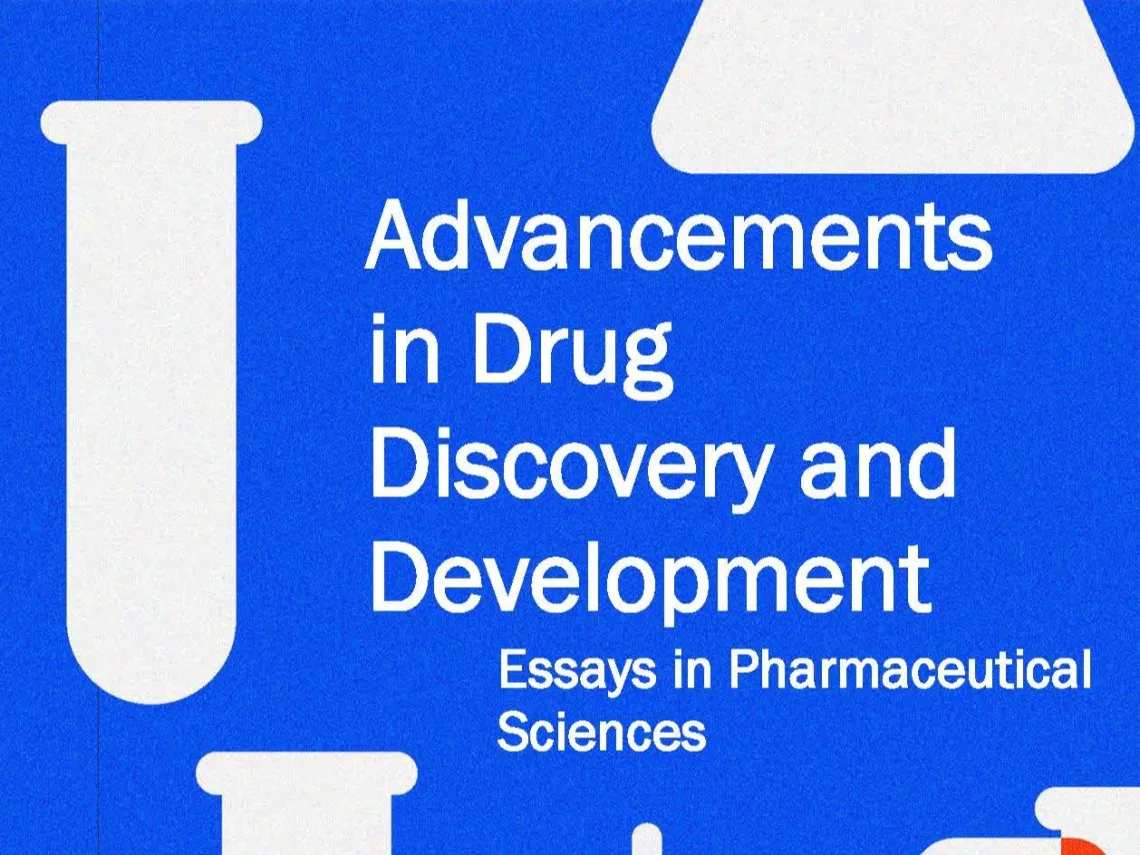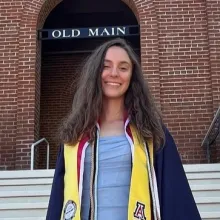Undergrads Publish Pharmaceutical Sciences Book, Now Available on Amazon

Four students enrolled in the course PCOL 305 – Scientific Writing: From Manuscripts to Proposals had a unique opportunity this past spring. Under the guidance of Jennifer Schnellmann, PhD, they co-authored and published the book Advancements in Drug Discovery and Development: Essays in Pharmaceutical Sciences. The book was produced during the second half of the semester as a hands-on learning experience for top course performers and serves as a culmination of everything students learned under the guidance of Schnellmann.
Co-authors Rishi Chunduru, Alanis Dilic, Jack Hooker, and Maryam Al Mohammed were selected to participate in an advanced writing project. Offered in weeks nine and ten of the semester, ten top-scoring students – known as the League of Ten – are awarded the opportunity to conceive of, research, draft, and produce a book for publication with the support of Schnellmann. Combining the course’s goal to teach students to read and interpret scientific writing and compose manuscripts and research proposals, this project is a massive undertaking available only to those select few students each spring. Although not required to accept the proposal, the chance to become a published author is a rare and exciting opportunity for an undergraduate student.

Alanis Dilic
PCOL 305 is a required course for the BSPS program. Over fourteen weeks, students learn everything from the basics of writing to the proper scientific procedure for drafting and producing proposals. Geared towards juniors and seniors in the BSPS program, the course is an excellent resource for any student interested in scientific writing and research. Dilic, who graduated this year with a degree in Neuroscience and Cognitive Science, emphasizes the value of the class even for those not in the BSPS program. “Since I’m a Neuroscience major, the rigor of this class combined with Dr. Schnellmann’s framework was scary but brilliant,” she said. “I was anxious entering the class, but the way she provides feedback and holds us to a high standard helped me settle in very quickly.”

Rishi Chunduru
Chunduru, a junior in the BSPS program, emphasized the benefits of the course on his writing quality and process. “My support structure of peers and classmates gave me the confidence boost I needed in this class to take on this project and be so ambitious with it,” he said, referencing the nearly 300-page book the group produced in just under 5 months. “I feel a lot more confident in my scientific writing skills.”
Upon being selected for this unique opportunity, Dilic and Chunduru instantly set out to brainstorm ideas on what they would write. “My first addition was the topic of nuclear magnetic resonance (NMR),” Chunduru stated. “I thought we could add some developments that happened in that field, and from there it evolved, adding more topics, and eventually we landed on the idea of interviewing U of A faculty.” From here, Dilic began to draft an outline of what their essays would cover. Although not limited to pharmaceutical sciences, they both agreed that their interest and passion for the subject would keep them focused on that area. “We thought this would be a super ambitious project,” Chunduru added, “so we reached out to fellow members of the League of Ten, and that’s where Jack and Maryam stepped in.”

Maryam Al Mohammed
For Al Mohammed, a senior, the prospect of writing a book in such a short time frame was daunting. “When I first got to the League of Ten, I was very hesitant to accept the proposal,” she admitted. “But as soon as I found out groups were forming and Rishi and Alanis had a really interesting topic, I was interested. Joining their group encouraged me to proceed with the project.” Hooker, also a senior, commented on the intimidating reputation PCOL 305 has among BSPS students, saying “When I first signed up for this class, I had friends who told me, ‘You need to focus and lock in’.” For those who have the chance to collaborate on the project, it becomes a balancing act between research, writing, re-writing, and collaborating that many find intimidating. “The more we wrote and the longer the class went on, the more we could understand what Dr. Schnellmann was looking for,” Dilic said.

Joseph Hooker
To accommodate the demanding workload and short timeframe, the group developed strict guidelines and systems to help themselves succeed. “In the early steps, we were guided by Dr. Schnellmann. In less than a day we had a solid outline going,” Chunduru stated. “We developed a system to keep ourselves organized – we had a shared Google Drive and scheduling.” Dilic added that Schnellmann provided them with invaluable resources like PubMed, a biomedical literature database, and EndNote, a citation software, to keep them organized and on track. “I came up with a rough outline of the essay, and Rishi narrowed it down with the biologics and types of synthesis. Then Jack and Maryam put in their special topics, like nanotech, AI and ethics.”
Hooker highlighted the challenges the group faced while learning how to tackle project management and tight deadlines, saying “We had a lot of freedom within what we were writing – it wasn’t like a set assignment. It was easier because we all made ourselves accessible to each other for peer reviews and regular check-ins.” Communication and feedback became an integral part of the writing process. “We had great teamwork. If one of us struggled, others would step up and help,” Al Mohammed added.
By the end of the course, Chunduru, Dilic, Hooker, and Al Mohammed had interviewed multiple College of Pharmacy and Department of Chemistry and Biochemistry faculty members and researchers, written and submitted numerous essay drafts, gone through countless feedback sessions, and finalized the essays that would comprise the final product, which was published as a paperback book on Amazon on August 8, 2024. When asked about advice they would give to students looking to enroll in PCOL 305 and work to join the League of Ten, they mentioned multiple ways students find success in this class.
Hooker emphatically stressed this advice “Do not miss class. You need to be there and you need to ask questions. Submit your drafts for feedback every time, email your preceptors as much as you can, and use your resources – it’s the only way to succeed.” Al Mohammed agreed with him, and added “Something that helped me was Dr. Schnellmann’s feedback on assignments. It was much needed, and she would give us tips and tricks. Our success was in large part thanks to her.” Finally, Dilic reminded future students to go with the flow in this course. “The class is a process, and you’re going to hit the ground running. If I could go back and take this class again, I would.”
Although the group has no active plans for a volume two of their work, they each discovered a passion for the subject and a confidence in themselves that will continue throughout their academic careers. “Dr. Schnellmann would remind me to have confidence in my education and what I’ve been able to accomplish, and hearing that from her was impactful,” Hooker reflected. “Now I approach my classes thinking, ‘I just wrote a book, so I can get through Physio 201 and 202 this summer.’ I have a new level of educational confidence that I didn’t have before.”
In the future, Both Al Mohammed and Hooker plan to earn a PharmD, and Hooker hopes to one day return to the classroom to teach. Dilic, who graduated after writing the book, is now a PharmD freshman at the U of A. Chunduru is looking forward to graduating with his BSPS degree and pursuing new research projects as a graduate student.
Schnellmann, director of the BSPS program, teaches medical, graduate, and undergraduate students across several courses throughout campus. “We have facilitated publications of more than 40 unique authors so far, and I can say that my biggest goal is to simply get out of the way,” she said. “This is in such contrast to the time spent on each student every week as they generate scientific writing assignments that both of us are relieved. Our major naturally attracts students who want rigor and desire to work very hard. This additional writing opportunity allows those who want even more challenges to become visible scholars for their incredible effort.”
To learn more about PCOL 305, visit the course curriculum.

